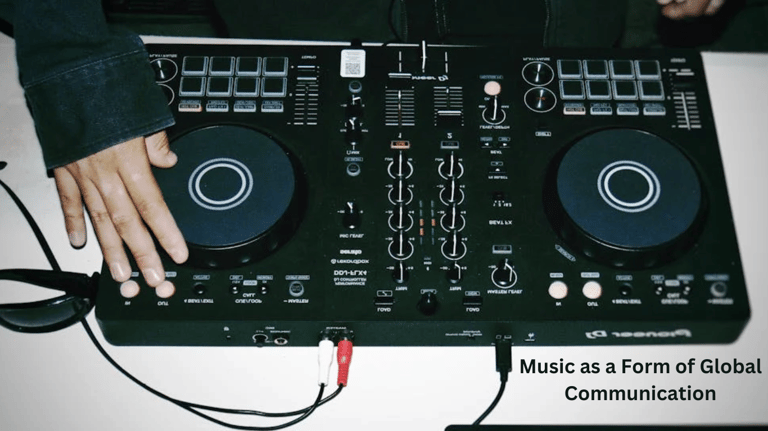Understanding World Music A Reading List for Global Sounds
1/15/20256 min read


Understanding World Music: A Reading List for Global Sounds
Understanding World Music: A Reading List for Global Sounds
World music is a rich and biggest genre and an enormous vast category of all diversified sounds are fused from every corner worldwide. It cuts across various categories and styles like folk music or more modern, current fusion sounds; it represents a big avenue toward finding diverse musical and cultural traditions from diverse communities and the histories of such forms. For people looking to delve deep into world music, knowledge about its origins, evolution, and influences can be quite a transformation journey. Reading would be the best approach to this diverse and vibrant genre.
This article is a must-read list for everybody interested in world music. These books will help you learn more about the world of sounds and their implications for culture, whether you are a music lover, student, or professional.
1. Introduction: Why World Music Matters
The term world music first gained popularity in the 1980s and refers to different genres of Music from other parts of the world, mainly non-Western. This is connected to combining older sounds with more recent reworkings; secondly, culture is highlighted because it is the song's foundation.
Why World Music is Important:
• Cultural Awareness: It raises people's cultural awareness of their earlier traditions, religious beliefs, or history.
• Musical Diversity: This genre offers listeners a wide range of musical instruments, beats, and tunes, some of which they may be unfamiliar with.
• Global Connectivity: Music will unite people with different tastes from around the globe because Music remains one language. Thus, the books listed explored and appreciated diverse sounds coupled with histories and stories that impact the global scope of Music.
2. Books to Read on World Music
Numerous books describe this broad and diversified global sound landscape. Here is a good reading list that will provide detailed knowledge about world music types and their cultural background.
2.1. "World Music: A Global Journey" by Terry E. Miller and Andrew Shahriari
It is one of the most vast resources that could be used to understand world music. It is from two musicologists on Music from entirely different cultural backgrounds while providing one with an introduction and some in-depth analysis.
•With Key Features:
Covers global musical traditions-from Africa to Asia to Latin America
audio examples only, in resources, and a multimedia learning experience. Cover the cultural context; therefore, covers each genre of Music comprehensively.
• Why it is A Read: It is a read for newcomers and old-school music lovers about world music, more broadly and Holistically, lovers of global sounds a must-read book.
2.2."The Rough Guide to World Music" by Mark Ellingham, Simon Boughton, Richard Trillo
The Rough Guide to World Music is the bible of abundant global musical styles. It encompasses all kinds of music-from the traditional setting of rural village music to modern city sounds of the urban setting.
•Features:
•Extensive profiles of the major musical genres and styles around the world.
•Insights into the evolution and fusion of different musical traditions.
Includes a massive list of recommended artists, albums, and music resources.
•Why To Read: World music is worth a read as a starting point; the language is pretty simple, really rich in extensive research, and not very technical as an introduction would do for everyone: casual, yet dedicated ones too.
2.3 "Music and Displacement: Diasporas, Migration, and Cultural Exchange" eds Priti K. Joshi and Walter A. L. Araujo
This book critically evaluates the relationships between Music and dislocation, showing how migration and diaspora have motivated the making of Music across cultures. On the other hand, it represents the network that joins culture and identity to Music and suggests that there is an association in Music since it can portray the voices of the migrants.
•Key Features :
No traces of the genesis of new cultural identity through Music. Traces the activities of a generation as regards the effects of movements and cultural intercourse with different Music. No Participants in this study are scholars of ethnomusicology and cultural studies.
• Why It's Necessary: This is the only source with information on the world music situation and how migratory and displaced factors have created global sounds. It must be read by anyone who will venture into fusing Music, culture, and identity.
2.4. "The Music of the Peoples of the World" by David M. Schneider
This book by Schneider has the finest minute details concerning the Music of many cultures worldwide-instruments, performance practices, and forms of many societies.
•Key Features:
No details on the various types of instruments and voice cultures functionality of Music within rituals and celebrations in community settings, as well as social living specifics concerning musical systems and the theory of several of the world's traditions.
•Why It's Important: It is technically essential to interested readers. This becomes excellent reading for the musician and the interested ethnomusicologist who may want to learn how a specific type of cultural music experience sounds.
2.5. "The Globalization of Music" by Mark Slobin
Mark Slobin addresses globalization through how Music could cross borders and change as it travels. This book discusses technological, media, and migration forces changing musical cultures worldwide.
•Key Features:
This is one form of communication and technology found in the global context. In this regard, it has changed the face of the globe in terms of world music.
This relates to the cross-cultural blending and merging of different forms of Music.
•Discourse of how globalization impacts the modern manifestations of folk music.
•Why It's Interesting: Any reader who has ever thought about how the shifting sands of globalization continue to influence the sounds they like can find this information enlightening to know more about globalization and world music. It best serves those searching for knowledge across crossovers between tradition and modernity and world music.
3. Themes Emerging through the World Music Discourse
To understand world music, one must hear other sounds and trace the cultural and historical backgrounds from which the sounds flow. Here are a few themes arising from the discourses found in the books that follow.
3.1: Music as an Agent of Cultural Identity
Music is part of the culture and is a mode of expression. Folk music in Eastern Europe or reggae beats in Jamaica. Every musicality has its place and base from a community in culture and history.
Key Takeaways
•Music is a symbol of collective identity, traditions, and norms
•Represent the life-cycle ceremonies of every culture, like birth, marriage, and death.
•Music is also flavoured with the resistance where there is a protest song, political Music,
3.2. Fusion and Cross-Cultural Influences
This is one culture formed by sound fusion that gives out new outcomes. Books such as "The Rough Guide to World Music" are introduced to describe this tradition around the world that produces jazz, rock, and classical Music
•The style combination creates new ones as in Afrobeat and Latin jazz.
•Breaking the boundaries of Western Music is now going hand in hand with using traditional Music for Western productions and vice versa, creating innovative cross-cultural productions.
The future of world music is created by artists blending ancient and modern sounds.
3.3. Music: A Global Language
Transcultural ability is one of the most powerful dimensions of world music. Music is a common language that crosses borders, speaks to all hearts, and conveys emotions and stories without words.
•Key Take A Ways:
No Global Music Festivals WOMAD World of Music, Arts and Dance is one good example of Music's power in uniting people across cultures.
•The Music of one culture can inspire and influence the artists of another culture, so there would be a shared experience in artistic expression.
Music can be a tool of diplomacy and peacebuilding to bridge gaps between nations.
4. Conclusion: Exploring the World of Music
Appreciating world music beyond its rhythms and melodies requires an excellent appreciation for the cultures and history behind the sound and the stories the sounds carry. Therefore, some of the great books in this article are great places to dig into the sound of global Music and its varying musical traditions. You will understand how Music reflects people's lives and experiences worldwide. An idea that also gives a glimpse of how globalization and fusion impact world music and how it can be perceived as a mode of communication, exchanging culture as well. As you read these books, you will encounter an infinite universe of Music to actualize the infanthood of diversity. Suppose you are a serious music lover, a student of ethnomusicology, or a working musician looking to expand your knowledge. In that case, this reading list will help you understand global sounds as they shape the world of Music today.







